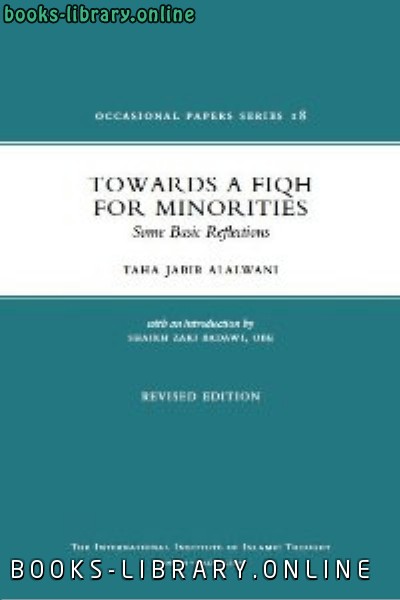📘 قراءة كتاب Towards A Fiqh For Minorities: Some Basic Reflections أونلاين


eword
v
Introduction by Shaikh Zaki Badawi
ix
Public Awareness of the Shari¢ah
xv
Shari¢ah and Culture
xvi
Present-Day Muslim Presence in the West
xvii
September
Definitions
Redefining the Question
The Need for Specialist Ijtihad in the Formulation
of a Fiqh for Minorities
What Can Be Learned from the Inherited Fiqh?
Reasons for a New Methodology
Reasons for a Clear Objective
Towards a Foundation for a Fiqh for Minorities
Methodological Principles for the Study of the Qur’an
Key Questions
A Fundamental Rule in Muslim Relations with Others
A Raised Nation
Standing up for One’s Rights
Forbearance
Lessons from the Emigration to Abyssinia
Notes
Glossary of Terms
-
, particularly those residing in the West, taking into account the
peculiar requirements of their condition and location. The study
remains as valid today as when it first appeared.
“Fiqh for Minorities” is an important subject and a much needed
contribution to an area of fiqh that has become essentialfor the well
being and development of Muslim communities living in non-
Muslim lands. Previous attempts to deal with the many serious issues
facing these communities failed to take into consideration the views
and contributions of Muslim social scientists who live in the West,
speak its languages and have a comprehensive understanding of its
social, political, religious and economic systems. As a result, many of
the recommendations and fatwas that came to be issued were inade-
quate and in some cases complicated the issues under consideration.
Dr. Alalwani’s recommendation that existing fiqh councils should
work closely with associations of Muslim social scientists and
involve these scientists on an equal footing with Shari¢ah scholars,
not simply as cosmetic additions, is an essential step towards building
a stronger and valid basis for the much needed perspective on fiqh.
The paper also calls for recourse to principles enshrined in the
philosophy of
maq¥|id al-sharÏ¢ah
(the higher intents and purposes of
Islamic law). Indeed, knowledge of
al-maq¥|id
is a prerequisite for
any attempt to address and resolve contemporary issues challenging
Islamic thought. No doubt such knowledge can help in the process of
Fiqh Text NEW_Fiqh Text.qxp 24/12/2013 10:11 Page v
developinga much needed objectives-based fiqh for minorities and
is essential for anyone who is interested in understanding and appre-
ciating the concept of divine wisdom underlying Islamic rulings.
Since few works in the English language have been available on
the subject of
maq¥|id al-sharÏ¢ah
, the IIIT decided to fill the vacuum
by initiating the translation and publication of a series of books and
occasional papers on
al-maq¥|id
to introduce this important and
difficult area of thought to English readers. These include to date,
Ibn Ashur Treatise on Maq¥|id al-Shari¢ah
,
Imam al-Sh¥~ibÏ’s Theory of
the Higher Objectives and Intents of Islamic Law
by Ahmad al-Raysuni,
Towards Realization of the Higher Intents of Islamic Law: Maq¥|id al-
Shari¢ah a Functional Approach
by Gamal Eldin Attia, and
Maqasid
al-Shariah as Philosophy of Islamic Law: A Systems Approach
by Jasser
Auda. In addition, as the topic is a complex and intellectually chal-
lenging one, with most books appearing on the subject written
mainly for specialists, scholars and intellectuals alone, the IIIT
London Office has also produced simple introductory guides to the
subject as part of its Occasional Papers series with a view to providing
easy to read, accessible material for the general reader. These include
Maq¥|id al-SharÏ¢ah Made Simple
by Muhammad Hashim Kamali,
Maq¥|id al-SharÏ¢ah: A Beginner’s Guide
by Jasser Auda, and
The
Islamic Vision of Development in the Light of Maq¥|id al-SharÏ¢ah
by
Muhammad Umer Chapra.
In essence Dr. Alalwani’s paper is really a call for Muslim minori-
ties to have a sense of themselves as citizens and develop a positive,
confident view of their place and value in society, moving away
from notions of immigrant status. In broadening the concept of a
fiqh for minorities therefore to a wider notion of a fiqh of citizenship
we give recognition to the cultural and pluralistic milieu in which
Muslim minorities find themselves, governed by a humanistic vision
focusing on the betterment of society.
We hope that this paper with its innovative approach,
Book author :
This book is a timely and important subject and a long awaited contribution to an area of fiqh that has become essential for the well being and development of Muslim communities living in the West. The author stresses that the problems of Muslim minorities can only be tackled with a fresh juristic vision based on ...
سنة النشر : 2003م / 1424هـ .
حجم الكتاب عند التحميل : 401.7 كيلوبايت .
نوع الكتاب : pdf.
عداد القراءة:
اذا اعجبك الكتاب فضلاً اضغط على أعجبني و يمكنك تحميله من هنا:

شكرًا لمساهمتكم
شكراً لمساهمتكم معنا في الإرتقاء بمستوى المكتبة ، يمكنكم االتبليغ عن اخطاء او سوء اختيار للكتب وتصنيفها ومحتواها ، أو كتاب يُمنع نشره ، او محمي بحقوق طبع ونشر ، فضلاً قم بالتبليغ عن الكتاب المُخالف:
 قبل تحميل الكتاب ..
قبل تحميل الكتاب ..
يجب ان يتوفر لديكم برنامج تشغيل وقراءة ملفات pdf
يمكن تحميلة من هنا 'http://get.adobe.com/reader/'


 منصّة المكتبة
منصّة المكتبة